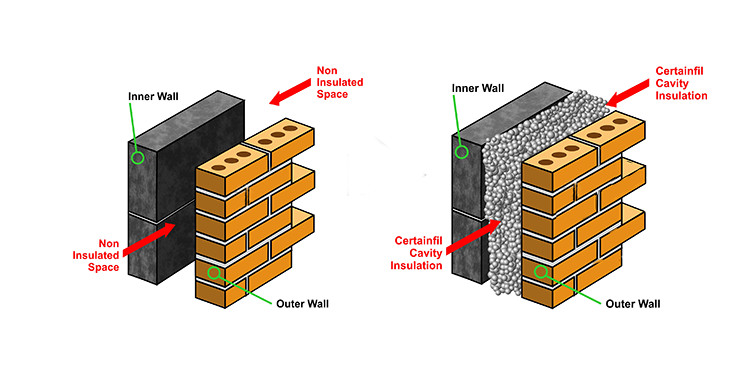Cavity wall consists of double walls with a hollow space between them. A wall constructed two leaves or skins with a space or cavity between them is called a cavity wall. It is commonly constructed as an external wall.
Cavity wall thickness of an outer wall and inner wall may be equal or the inner wall may be thicker than the outer wall. Cavity wall hollow never exceeds 100mm and it is uniform through the height.
The main purpose of constructing a cavity wall is to prevent the penetration of rain to the internal surface of the wall. It is essential that cavity walls are not bridged in any way as this would provide a passage of moisture.
The masonry skins of a cavity wall can be brickwork, blockwork or similar. Different masonry materials can be used on either side of the cavity. The cavity is initially empty but can be filled with insulation by various methods.
Cavity walls are more time consuming and therefore slightly more expensive to build than walls with the two skins bonded together, but they provide better sound and heat insulation and most importantly resistance to rain penetration.
The main consideration in the construction of cavity wall above ground level damp proof course of a brick or block which will give the required durability, strength and appearance.
To overcome this problem, it is common practice to fill the cavity below ground level with a weak mix of concrete thus creating a solid wall on the ground.

Cavity Walls – hollow space cavity wall and cavity wall insulation
Advantages of cavity wall construction
Damp Prevention: cavity wall checks the prevention of dampness from outside to inside of the building in the better way than a solid brick wall of the same thickness.
Heat Insulation: since air is a bad conductor of heat, a cavity wall decreases the heat transmission considerably hence it is easier to maintain uniform temperature inside the building.
Sound Insulation: sound waves can travel faster in solid media than air, the cavity wall constructions considerably dampens the external noise and inside the building, external disturbances have little effect.
Economical: The construction cost of a cavity wall is about 20% less than the construction cost of a solid wall having the same thickness.
Able to withstand a driving rain in all situations from penetrating to the inner wall.
Disadvantage of cavity walls
- Requires a high standard of design and workmanship to produce a soundly construction wall
- Require good supervision during construction.
- The need to a vertical damp proof course to all openings
- Slightly higher cost than a standard one brick thick wall.
